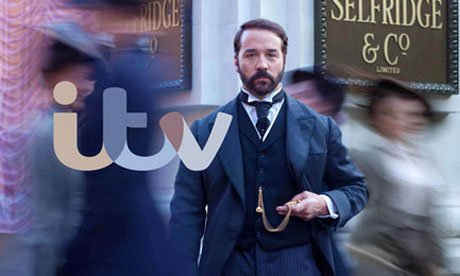
Sunday best ? ITV costume drama Mr Selfridge.
This week we launch MediaGuardian 25 ? our survey of Britain's 25 most important media companies, covering TV, radio, newspapers, magazines, music and digital. Starting with an analysis of ITV, we'll review the state of the big media players.
When Adam Crozier was unveiled as chief executive in January 2010 a recession-scarred ITV was struggling to recover from a ?2.7bn annual loss and had a ?1bn debt and pension deficit, leaving jaded investors valuing it at a tepid 56p a share. Fast forward three years and Crozier, who will on Monday unveil ITV's biggest on-screen branding overhaul in 11 years, has become something of a City darling.
Investors, ignoring signs that Simon Cowell's The X Factor may be running out of steam, have pushed ITV's share price to more than double the level it was when Crozier arrived ? it recently topped ?1 for the first time in five years.
Analysts at Liberum have even had the chutzpah to put a target price of a sky high 155p on ITV, a level not seen even immediately after the Carlton/Granada merger which created the UK's largest advertiser-funded commercial broadcaster back in 2004.
An unrelenting focus on hammering the broadcaster's previously parlous finances into shape means that Crozier now presides over a debt-free ITV that has about ?800m in cash, and is expected to report pre-tax profits of about ?350m when 2012's results are unveiled next month. Under Crozier's well-incentivised contract he will be eligible to cash in more than ?4m in share options in April ? on top of his multi-million pound annual pay cheque.
He is now more than halfway through his five-year transformation plan, which aims to reduce ITV's dependence on TV ad revenue, primarily by boosting its production and distribution business and driving digital revenues. Yet ITV is still almost completely reliant on TV advertising ? accounting for about ?1.5bn of a total of ?2.2bn revenues ? and the broadcaster's fortunes continue to be pegged to the state of the notoriously cyclical ad market.
Crozier signed on when ITV was climbing out of the UK's worst ever advertising recession ? its share price fell as low as 17p ? and enjoyed the fruits of a recovery in the ad market in his first year in charge in 2010.
"In the very early stages there was some luck, 2010 saw a massive rebound in the advertising market, but a programme of fundamental changes takes time," says Thomas Singlehurst, head of European media equity research at Citigroup. "Real work has been done on the finance and treasury function. At one point banks wouldn't touch them. There were issues including real concerns about ITV's solvency and a burgeoning pension problem. Lots of these issues have been resolved and hence the change in the perception, and share price, in the stock market."
But the main investor-pleasing feather in Crozier's cap has been the revitalisation of production division ITV Studios, which makes and sells shows including Coronation Street, Mr Selfridge and Dancing on Ice. Profits have rebounded in the past year, with ITV forecasting more than ?100m.
One analyst says that the revenue growth is a better gauge of the transformation of the production business, up from ?554m to an estimated ?700m in two years. Crozier still has a lot of work to do to hit his target of 50% of ITV's total revenues coming from non-TV advertising sources by the end of 2015. In 2010 TV ad revenue accounted for 75% of total ITV revenues, now reduced to 67%.
ITV's lack of a coherent digital strategy has also historically been nothing short of an embarrassment. In 2010 digital revenues were just ?28m.
In the past two years the broadcaster has dramatically increased the distribution of its online TV service, ITV Player, to platforms including Virgin Media, Sky Anytime and handheld and gaming devices such as PS3, Android and Apple phones. A digital pay strategy has been introduced which includes licensing shows to LoveFilm and Netflix, as well as charging for some programmes on the ITV Player.
This has helped fuel digital revenue growth in two years to about ?95m in 2012, however this is still less than 5% of ITV's total revenues.
Mathew Horsman, director at consultancy Mediatique, remains to be convinced that Crozier is fundamentally changing the business.
"He hasn't really transformed ITV in the way he set out to do," he says. "It is not a bad place to be if those [TV] revenues are being generated. But it isn't a completely new beast, he hasn't really gone into pay-TV and has done very little in video-on-demand, they are quite small parts of the business. In effect he has got away with not transforming ITV."
So while Crozier has sorted out ITV's finances and grown its production business, more work needs to be done to ween the company off its TV advertising habit.
Market capitalisation: ?4.21bn on share price of 110p as at close on Friday 11 January
Source: http://www.guardian.co.uk/media/2013/jan/13/itv-city-darling-mark-crozier
knicks the monkees ciaa love actually strikeforce davy jones deep impact
No comments:
Post a Comment